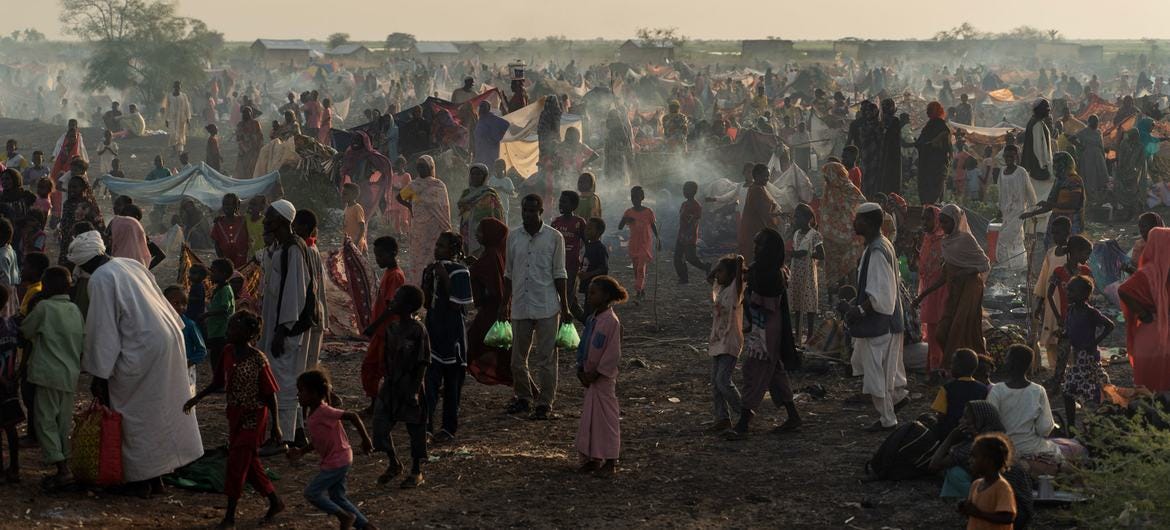Former BBC correspondent in Sudan: Sudanese diaspora must lead peace efforts amid ongoing conflict
The roots of atrocity: How RSF became a power player in Sudan’s conflict
A research associate at Oxford University and former BBC correspondent in Sudan describes the ongoing crisis in Sudan as "a disaster, and Democratic oppositions have been useless.”
Over the past year and nine months, Sudan has been engulfed in a brutal civil war between the Sudanese Armed Forces (SAF) and the Rapid Support Forces (RSF). The conflict, which began in April 2023, has displaced millions, caused the collapse of infrastructure, and led to a severe humanitarian crisis. It escalated due to a power struggle between the army's leader, General Abdel Fattah al-Burhan, and the RSF commander, Mohamed Hamdan (known as Hemeti), turning large parts of the country into battlefields.
In an interview with Hybrid Magazine, Dr. Fergus Nicoll sheds light on the complex situation, highlighting the dangers posed by the Rapid Support Forces (RSF), the ineffectiveness of democratic opposition groups, and the role of international players like the UAE.
Nicoll, whose academic work includes a biography of the Mahdi and an analysis of British policy in Sudan, emphasizes the difficulty of journalistic impartiality in the face of such chaos. "It is extremely difficult to be impartial under these circumstances," he said. "I have seen a few reports; in fact, everybody is leaning on social media. I think journalists can criticize all sides of the conflict."
“Rapid Support Forces (RSF) had its root in Janjaweed, a notorious militia, which was essentially government proxy militia in Darfur. They did all the dirty work for the government. They did all the dirty work for the government in trying to make sure that the potentially disruptive peripheral parts of Sudan remained destabilized so as not to throw, you know, a threat. Of course, the Sudan army was so bad and so useless, but the Janjaweed were a particularly nasty paramilitary force that focuses entirely on civilians. Their modus operandi is just killing, raping, and burning villages. They've done this for least 25 years.’ he said.
Dr. Nicoll points out the danger of this group and continues, "I think a couple of things made the RSF as dangerous as it is now. First, a previous version of the government, sort of an Islamist slash military coalition that's run Sudan for a long time, made the mistake of bringing them into the tent and said, We let you call yourself RSF. You're not the national army, but you're on our side. Another thing was that they allowed them to be used in other people's wars, which made them very, very rich. So they went to fight in Yemen, and the Saudis paid them fortune to fight the Houthi in Yemen. They fought in the Libyan Civil War. And it's really murky. It's very hard to know exactly who's paying who, but the net result is that when the RSF comes back from these campaigns and they start raising hell in Sudan again, they have so much money.
In terms of the contemporary situation in Sudan, he mentioned the role of the UAE and says, "It is widely accepted that the UAE supports Hemeti and the RSF. Why? You should ask somebody at one of the Emiratis why they want to destabilise another North African state. What's their game in causing these mass atrocities? They don't seem to have any kind of business plan yet. Maybe there's a business plan once Sudan is so destroyed, you can rebuild it or something. I don't know exactly what they could be, and of course, they deny it completely. But I think everybody accepts that the UAE is the largest backer of their making, in addition to their occasional mercenary activities that have been so so looked at.
In response to this question, what role could the Sudanese diaspora play in supporting peace efforts, Dr Nicoll says: Well, I think the Sudanese diaspora can play a significant role by making concerted efforts. There are many Sudanese NGOs actively working, supported by substantial diaspora funding, often for communities that operate under the radar.
However, we are now a year and nine months into this situation, and there’s still no tangible progress toward peace. People keep asking, ‘Will there be another round of peace talks?’ In my view, the democratic opposition outside Sudan needs to take the lead or at least prepare for the aftermath of any peace talks.



